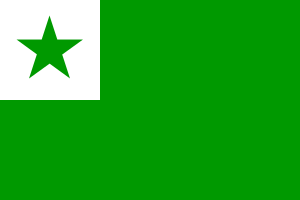The following outline is provided as an overview of and topical guide to Esperanto:

Esperanto[1][2] is the most widely spoken constructed international auxiliary language. L. L. Zamenhof, a Polish-Jewish ophthalmologist, created Esperanto in the late 19th century and published the first book detailing it, Unua Libro, in 1887 under the pseudonym Dr. Esperanto, Esperanto translating as "one who hopes".[3]
What type of thing is Esperanto?
editEsperanto can be described as all of the following:
- Esperantido
- Mundolinco
- Reformed Esperanto (Esperanto 1894)
- List of Esperanto organizations
- World Esperanto Congress
- Akademio de Esperanto
- Universal Esperanto Association
- World Esperanto Youth Organization
- International Youth Congress
- European Youth Week
- World Anational Association
- Encyclopedia
- Pasporta Servo
- Plouézec Meetings
- European Esperanto Union
- Europe–Democracy–Esperanto
- Panamerican Congress
- Skolta Esperanto Ligo
Presidents of Universal Esperanto Association
editAdditional Esperanto organizations
edit- Esperanto club
- International League of Esperantist Radio Amateurs
- Akademio de Esperanto
- Akademio Literatura de Esperanto
- Arbeidernes Esperantoforbund
- Association of Green Esperantists
- Bahá'í Esperanto-League
- Buenos Aires Esperanto Association
- Distributed Language Translation
- Esperantic Studies Foundation
- Esperanto Museum and Collection of Planned Languages
- Europe–Democracy–Esperanto
- European Esperanto Union
- Icelandic Esperanto Association
- Indigenous Dialogues
- Indonesian Esperanto Association
- International Esperanto League
- International League of Christian Esperantists
- International League of Esperanto Teachers
- International Union of Catholic Esperantists
- Iranian Esperanto Association
- Junularo Esperantista Brita
- Mondpaca Esperantista Movado
- Pasporta Servo
- Plouézec International Meetings
- President of the Universal Esperanto Association
- Quebec Esperanto Society
- SATEB
- Sennacieca Asocio Tutmonda
- Skolta Esperanto Ligo
- Terminologia Esperanto-Centro
- Universal Esperanto Association
- World Esperantist Vegetarian Association
- World Esperanto Youth Organization
National Esperanto organizations
edit- Australian Esperanto Association
- Esperanto Association of Britain
- Canadian Esperanto Association
- Croatian Esperanto League
- Esperanto in Malaysia
- Iranian Esperanto Association
- New Zealand Esperanto Association
- Norvega Esperantista Ligo
- Taiwan Esperanto Association
- Esperanto-USA
- Esperanto in Korea
- Esperanto in China
- Esperanto in Japan
Esperanto meetings
editEsperanto ideas
editDictionaries
edit- Komputeko
- Pekoteko
- Plena Ilustrita Vortaro de Esperanto
- Plena Manlibro de Esperanta Gramatiko
- Plena Vortaro de Esperanto
- Reta Vortaro
- La Vortaro
- Vortaro de Esperanto
Encyclopedias
editEsperanto literature
editEsperanto novels
edit- Abismoj
- Children of Orpheus
- Gerda malaperis!
- Kazohinia
- Kredu min, sinjorino!
- Metro (novel)
- Mr. Tot Aĉetas Mil Okulojn
- Saltego trans Jarmiloj
- Tur-Strato 4
- Voyage to Faremido
Esperanto media
editEsperanto magazines
editHistorical publications
editEsperanto education
editSee also
editReferences
edit- ^ Jones, Daniel (2003) [1917], Peter Roach; James Hartmann; Jane Setter (eds.), English Pronouncing Dictionary, Cambridge: Cambridge University Press, ISBN 3-12-539683-2
- ^ Wells, John C. (2008), Longman Pronunciation Dictionary (3rd ed.), Longman, ISBN 978-1-4058-8118-0
- ^ "Doktoro Esperanto, Ludwik Lejzer Zamenhof". Global Britannica.com. Encyclopædia Britannica Inc.